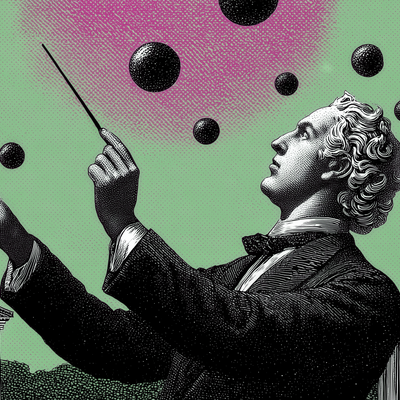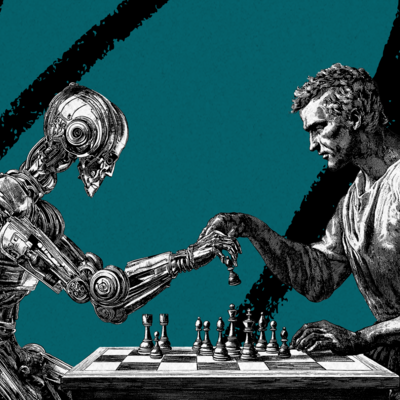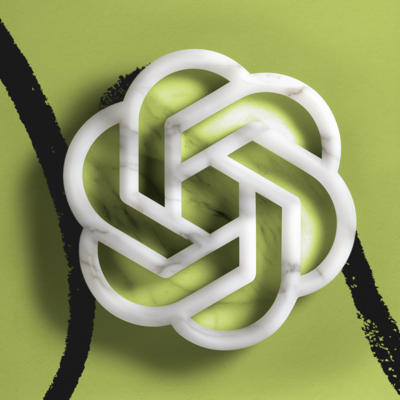
The last year was one of the craziest in human history. We created a new paradigm in computing with large language models, launched the largest rockets in human history, and made solar power cheaper than ever before. April 1, 2023 was truly a different world. Our job at Every is to tell you the future, and in order to do that we need to take a deep breath. So we’re taking a Think Week: We’ll be publishing some of our greatest writing on AI and giving our team the space to dissect the ideas, questions, and themes that captivate us so we can create a better product for you. It starts with our higher-level theory pieces and moves down to our more tactical work as the week progresses. First up is Dan Shipper’s piece about how AI has helped him articulate his taste.—Kate Lee
A few years ago, when I felt like I was grasping desperately for something in my life that I couldn’t name, I used to get up after midnight to smell spices.
They would be standing like little toy army men on the gray countertop in my kitchen, a battalion of clear glass cylinders that tapered slightly at the top to meet green metal lids with ribbed edges. On the top of each lid was a label in white serif script: cinnamon, turmeric, chili powder, garlic powder, cumin, bay leaves.
I’d stand by the spices and close my eyes. I’d carefully rearrange the bottles into a random order with my fingertips. Then, with darkness wrapped around me like a blanket, I’d pick one up, unscrew the top, raise it to my nose, and sniff. I’d try to measure the resulting experience as carefully as a drill sergeant inspecting the posture of a new recruit. I’d note the sharp burn of cinnamon, the sweet cloy of bay leaf, or the dollar-pizza texture of garlic powder. Then I’d make my choice: “Chili powder,” I’d say.
I’d open my eyes, and look down. Cumin. (I was not very good at this when I started.)
I’d put the cumin down, rescramble the bottles, and start again. I’d do this over and over. After a while, my head would clear. I’d yawn, stretch, and go back to sleep.
. . .
Smelling things blindly and then labeling them helps your brain connect smells to words. Naming smells, in turn, helps you understand, refine, and communicate what you like and why. In short, naming is crucial to the development of taste.
I picked up my smelling habit from someone I met at a friend’s wedding. We were seated next to each other, and when he tasted the wine they served, he immediately reeled off a vivid list of tasting notes that would make a master sommelier blush: “Big fruit on the nose, flowers, black plums, with a little bit of chocolate.”
He did it with the obvious pleasure of someone who wasn’t performing a status-oriented party trick. He just loved wine, and he loved being able to describe why.
Listening to him name exactly what he liked about the wine turned up the hairs on the back of my neck. Suddenly, my own experience of the wine felt deeper and more satisfying. I wanted to know: How was he able to identify these flavors?
He told me the secret was to blindly smell things and try to label them. You see, the part of your brain that’s responsible for smells is naturally mute. It’s called the olfactory bulb, and it’s an ancient fist of neurons just behind your eyes. It has only indirect backroad connections to the parts of the brain that control language, like Broca’s area. So, even though you might have an easy time knowing whether or not you like a scent, it’s not easy to label that scent with a word. It’ll feel like groping through a dark closet for something you know is there, but can’t quite find.
My new friend at the wedding said that after building up his blind-smelling chops, the world opened up for him in ways he never could have imagined. He’d be on a hike and catch the faint redness of strawberry on the wind. Or he’d be sitting in his apartment and notice when his neighborhood bakery was making his favorite croissants.
I’ve found my midnight smelling habit has been a significant boon for my cooking. It’s now much easier to identify what I like about the food I’m eating. This heightens my enjoyment, makes it more enjoyable to talk about food, and makes it easier for me to make more of what I like in the future.
Now, cumin is not something familiar but unnamed in the background like an extra in a movie. Rather, it is a force to be called forth and deployed when needed. Cumin is a close-range tool, like a soldier armed with a cutlass or a crowbar. It’s best in chilis, soups, or meat dishes where each ingredient dukes it out with one another in hot combat in a large pot for many hours. It is not effective in lighter, cooler climes where subtler tools like butter or fresh basil are called for.
I think there’s a deep lesson here. It’s about how to develop taste, not just in food or wine, but in any creative endeavor that’s important to you: building products, writing essays, devising marketing campaigns, or making YouTube videos.
In each of these domains, you already know instinctively what you like. Moment by moment you are drawn to things: Apple’s Vision Pro, the title of a particular book, a certain YouTuber’s intro sequence. You also shy away from other things: try-hard tweet threads, or podcasts about conspiracy theories. But this whole process is done in a part of your brain that is pre-linguistic and intuitive. Therefore it’s private and unrefined.
Making what you like explicit is a powerful tool. It will help you articulate it to yourself and to other people. This will help you refine and make more of it.
The truly great creatives I’ve run into in business or in art can all do this incredibly well. They can look at a painting, a pitch deck, a product, or a novel and reel off exactly what they like about it and why.
Articulating what you like is the only way to make great stuff. And it’s a skill that can be learned. Interestingly, it’s one of the things that AI is great at teaching. (We’ll get to the AI a little later, though.)
The place to start when you’re trying to develop taste is to find and record the things you like.
Gathering your ingredients
Finding things you like is like panning for gold.
What you read, what you hear, what you do, what you see—it all rushes past you like mud and icy water in a rocky creek. Your task is to scoop it into a pan. Shake, sort, and sieve what you find. Save the bits that sparkle.
The Only Subscription
You Need to
Stay at the
Edge of AI
The essential toolkit for those shaping the future
"This might be the best value you
can get from an AI subscription."
- Jay S.
Join 100,000+ leaders, builders, and innovators

Email address
Already have an account? Sign in
What is included in a subscription?
Daily insights from AI pioneers + early access to powerful AI tools









Comments
Don't have an account? Sign up!
I was enjoying your writing here so much that I paused in wonderment. What is it about his writing that I like so much? Then as I continued on... ahh yes, there it is - it is both beautiful and lyrical.
My favourite post so far
I didn't really want to finish it, I just wanted to keep reading every time I was on a work break
I love the idea of an Ineffable List and this use of AI. I have several docs that I think I'll consolidate into my Ineffable List.
To play devils advocate on the AI returns on your taste. I found myself agreeing with nearly every point. I suspect that we share similar taste which is why I enjoy your writing. I also wonder if the AI summary was just vague enough that many people could see themselves in it, sort of like a horoscope.
Not to disparage this at all. I thoroughly enjoyed this and will try something similar myself.
Fabulous. Also see Ita Glass on taste and the book Cork Dork about sense training.
Ira not Ita!